It’s hard to imagine that someone can look at innocent and soulful puppy eyes and then turn their back on them and dump them.
All pups deserve to be showered with a lot of love, and yet they often find themselves abandoned and scared, wondering if anybody is coming to rescue them.
Jila was one of the sweet fur babies who was dumped on the side of the road. Covered in mange and shivering from cold, Jila curled up in her little doghouse. In those moments, her only wish was to be taken somewhere safe and warm.
A Little Fur Baby In Need Of Help
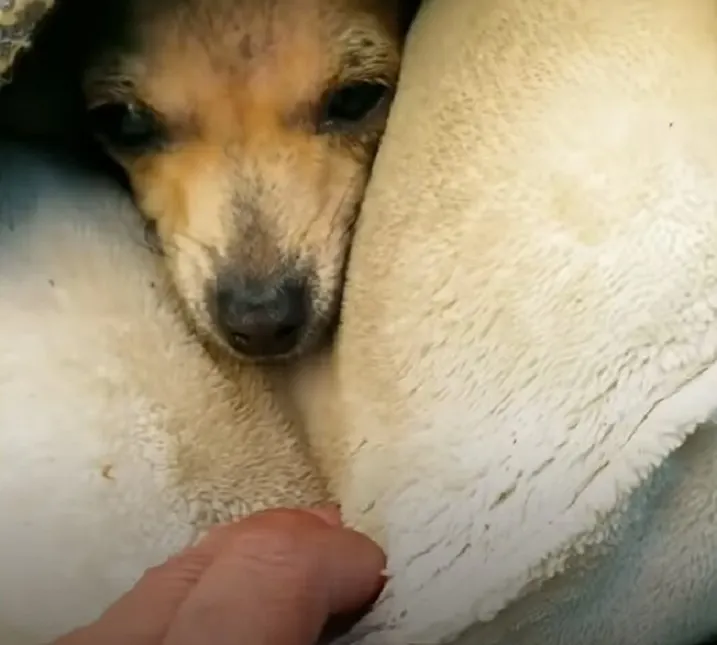
She immediately rushed toward the little house to check if there was someone in there. When she approached, the doghouse started moving.
Obregon felt heartbroken when a sweet, tiny puppy’s head peeked out of the house. The fur baby had the most adorable soulful eyes.
It was cold and rainy, and the little baby trembled.
Obregon noticed that the puppy was infested with mange. She comforted her and told her that everything would be fine. She wrapped her in a blanket and took her to her car.
The puppy’s eyes were filled with calmness as she looked through the car window.
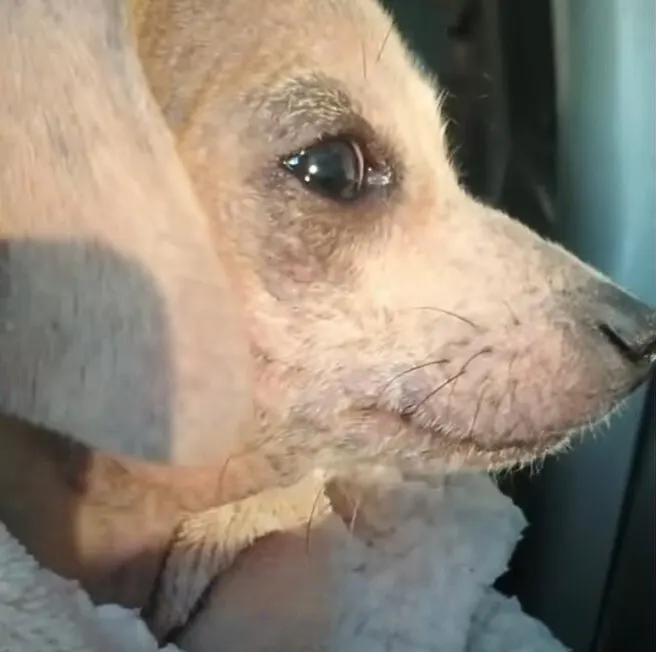
Obregon felt relieved that she had found the abandoned pup. She was convinced that she wouldn’t have survived another night in the cold.
Jila Receives A Lot Of Love
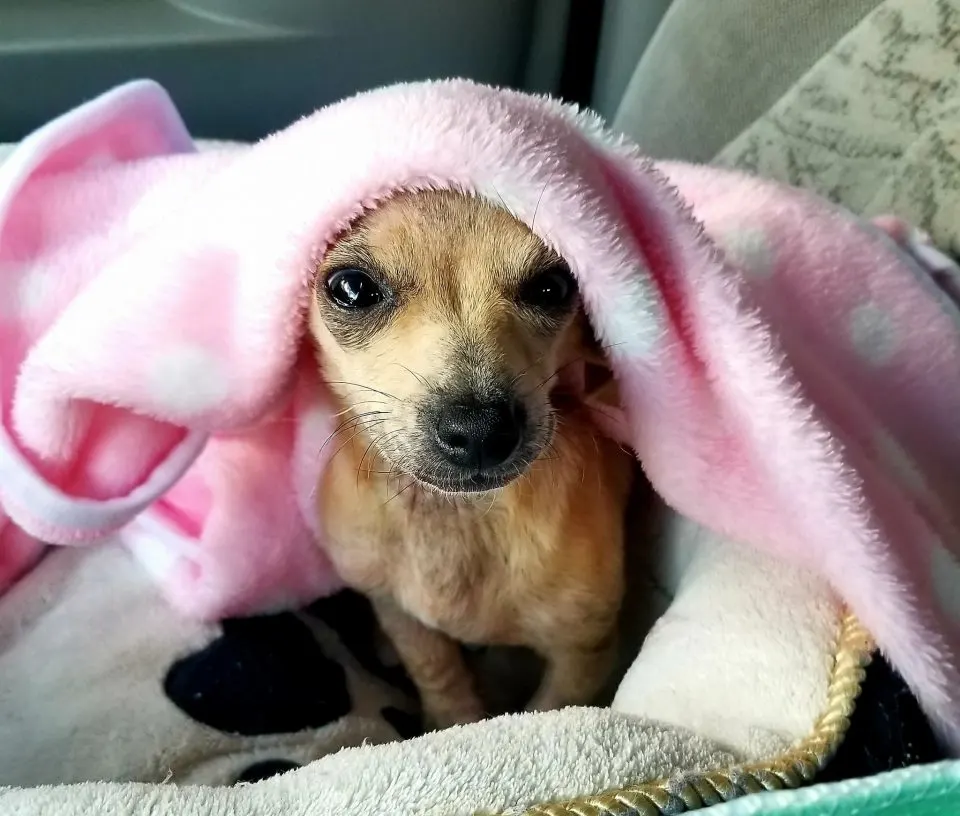
She took her to the vet. After being diagnosed with mange and skin infections, Jila was prescribed antibiotics and medicated baths.
Obregon brought the pup home and decided to be her emergency foster. She named her Jila because of her soulful eyes.
She fed her and gave her all the care and love she needed. Jila began feeling better and she slept a lot.
Obregon was convinced that Jila was an outside dog who never received the love that she needed very much.
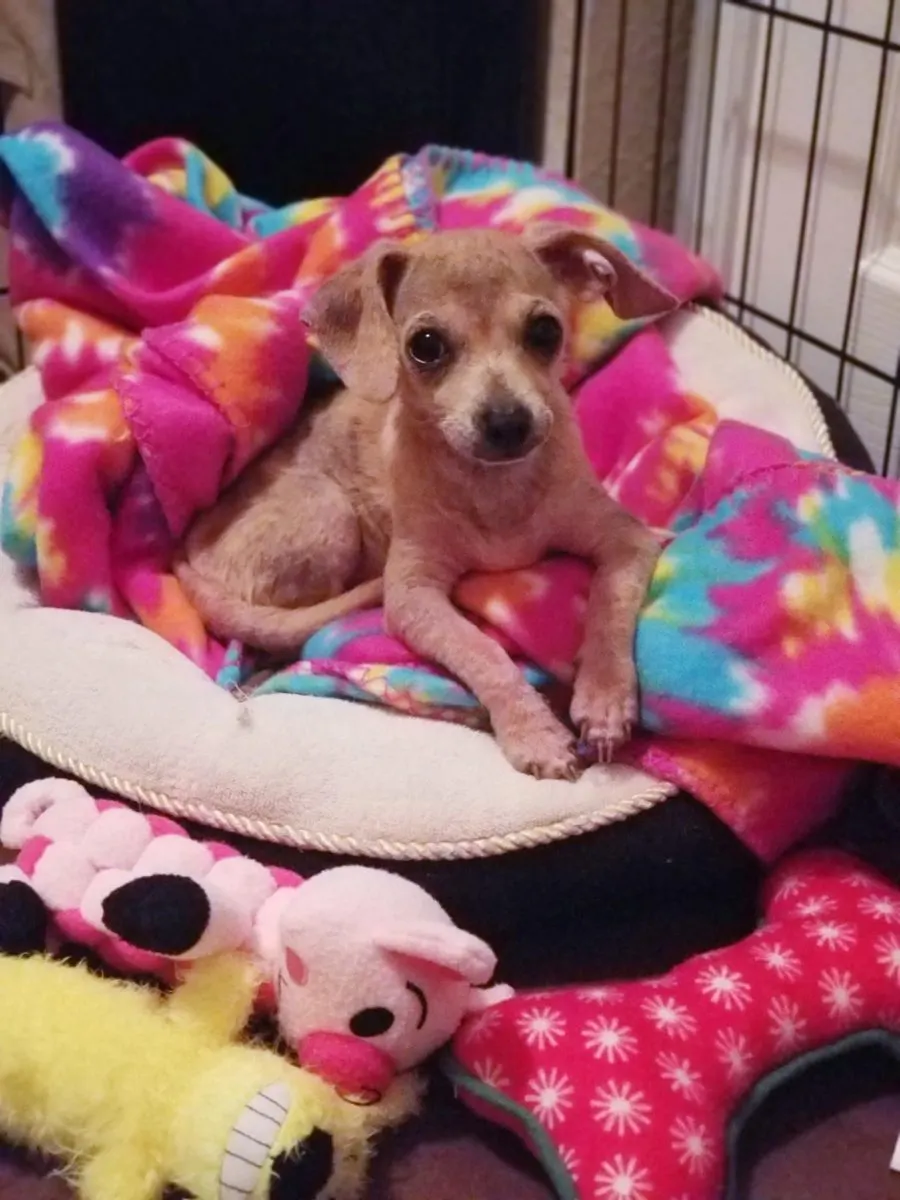
Jila licked her foster mom’s hands and snuggled with her. It was her way of showing how much she appreciated her help and love.
After a while, the pup moved in with her other foster mom, Emily, and she continued her road to recovery. The adorable fur baby loved cuddling with her and soaking up her love. Her cute face was glowing with happiness.

She had a great time playing with Clover, her foster doggy sibling.
The Pup Finds Her Forever Family
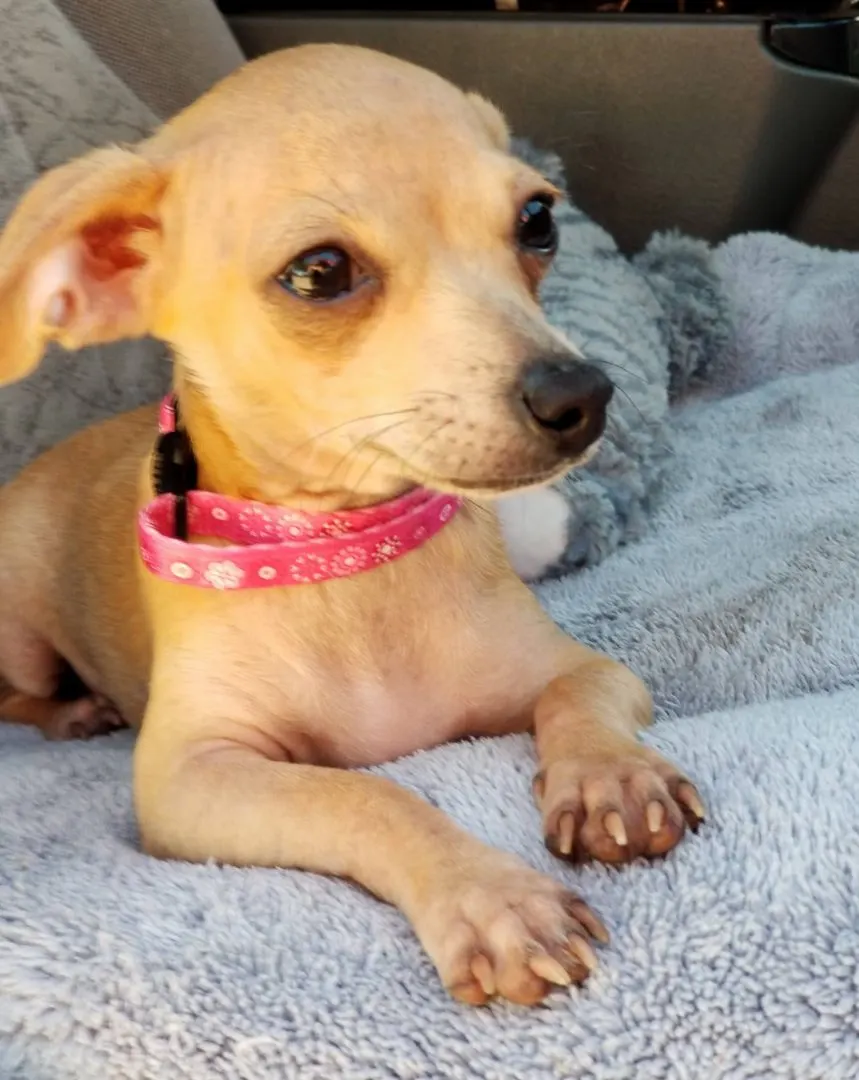
The moment Jila saw her forever mom, she ran into her arms and gave her a kiss. The gentle puppy was excited to move into her forever home. She fit in with her family right away.
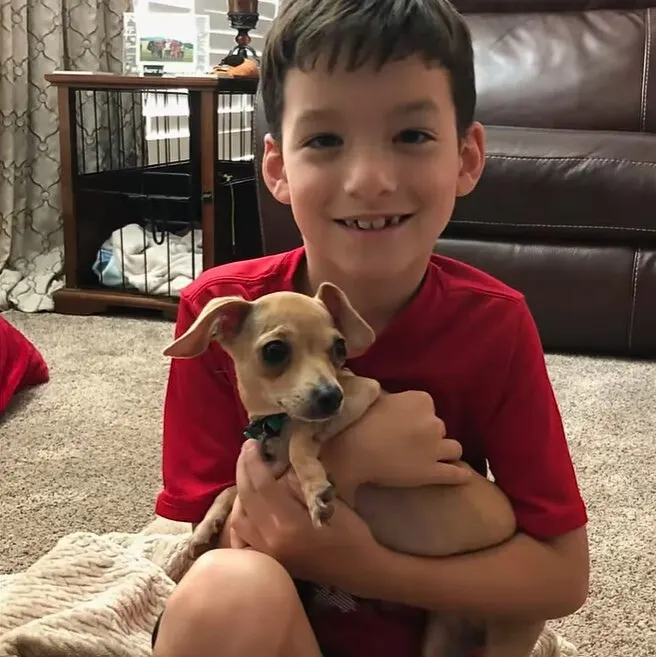
They hugged her and gave her many kisses, which the pup happily reciprocated. Jila felt adored, and she couldn’t contain her happiness.
“When I look at her, what I see is the word joy. Sometimes I don’t know that she even remembers being thrown on the side of the road. She’s just so overwhelmingly happy. Her little tail wagging all the time,“ Jila’s forever mom told The Dodo.
We couldn’t be happier for Jila. The wonderful pup found the love that she always deserved and needed.
If you’ve ever wondered about the fascinating journey of canine reproduction, understanding the gestation period of dogs can provide insights into this miraculous process. As a seasoned dog enthusiast, you know that the duration of a dog’s pregnancy is a pivotal aspect of their reproductive cycle. From the initial stages of breeding to the eagerly anticipated arrival of adorable puppies, the timeline of a dog’s pregnancy is filled with anticipation and excitement.
Throughout your experience working with dogs, you’ve likely encountered various aspects of their reproductive health. The length of time a dog carries her litter is not only a biological phenomenon but also a period of care and preparation for both the mother and the future pups. As we delve into the intricacies of canine pregnancy, you’ll gain a deeper appreciation for the wonders of nature and the unique journey that each dog undergoes during this special time.
Understanding Canine Reproduction
When it comes to canine reproduction, understanding how long dogs are pregnant is essential. A dog’s pregnancy, also known as gestation, typically lasts about 63 days. During this period, it’s crucial to provide proper care to the mother dog to ensure a healthy pregnancy and delivery of the puppies.
- Gestation Period: Dogs have a relatively short gestation period compared to some other animals. The average gestation period for dogs is around nine weeks, which totals to about two months. Monitoring the mother’s health and behavior during this time is crucial for a successful pregnancy.
- Signs of Pregnancy: You may observe certain physical and behavioral changes in a pregnant dog. These can include weight gain, nipple enlargement, increased appetite, and behavioral differences such as restlessness or nesting behaviors. Understanding these signs can help you provide the necessary care and support.
- Preparation for Birth: As the due date approaches, it’s important to prepare for the birth of the puppies. Creating a comfortable and safe whelping area, gathering essential supplies like clean towels and a heating pad, and having the contact information of a vet on hand are crucial steps to take.
- Whelping Process: When the mother goes into labor, it’s essential to monitor the birthing process closely. Most deliveries go smoothly, but being prepared for any complications is vital. Knowing the signs of labor progression and when to seek veterinary assistance can help ensure a successful birth.
Understanding canine reproduction, including the length of a dog’s pregnancy, is key to supporting the mother dog through this special time and welcoming a healthy litter of puppies. Remember to provide care, attention, and a supportive environment to the expectant mother as she prepares to bring new life into the world.
Duration of Canine Pregnancy
Knowing how long dogs are pregnant for is essential for taking care of the mother dog and preparing for the arrival of puppies. A dog’s pregnancy typically lasts around 63 days from the day of conception to delivery. Here’s what to expect during the different stages of canine pregnancy:
- Early Pregnancy (Weeks 1-3):
- During this period, the fertilized eggs travel to the uterus for implantation.
- The mother dog may show early signs of pregnancy like increased appetite and slight weight gain.
- Mid-Pregnancy (Weeks 4-6):
- By week 4, the fetuses begin to develop organs and grow rapidly.
- The mother dog’s belly will start to visibly enlarge as the puppies grow.
- Late Pregnancy (Weeks 7-9):
- In the final weeks, the mother dog may start nesting and preparing for the birth.
- She may become more restless and seek seclusion as labor approaches.
- The Labor and Delivery:
- Signs that the mother dog is about to give birth include restlessness, panting, and seeking a quiet place.
- Labor can last up to 12 hours, with each puppy being born in its own amniotic sac.
Monitoring the mother dog closely during her pregnancy is crucial for ensuring a safe delivery and the health of the puppies. Providing proper nutrition, a comfortable whelping area, and regular vet check-ups are vital for a successful pregnancy journey.
Care During Dog Pregnancy
During your dog’s pregnancy, it’s vital to provide her with the best care to ensure a safe and healthy delivery. Here are some essential tips to support your dog during this special time:
Proper Nutrition
Ensure your pregnant dog receives a well-balanced diet suitable for her stage of pregnancy. High-quality dog food rich in essential nutrients is crucial for her health and the development of the puppies.
Regular Vet Check-ups
Schedule regular visits to the vet throughout your dog’s pregnancy. Your vet can monitor the progress of the pregnancy, provide necessary vaccinations, and address any concerns or complications that may arise.
Exercise and Rest
While exercise is essential for keeping your dog healthy, it’s important to avoid strenuous activities during pregnancy. Encourage gentle exercise, such as short walks, and ensure your dog has plenty of rest to support her well-being.
Comfortable Whelping Area
Create a comfortable and quiet whelping area where your dog can give birth and nurse her puppies. Provide soft bedding, warmth, and privacy to help your dog feel safe and secure during labor and nursing.
Monitoring and Support
Pay close attention to your dog’s behavior and physical changes as her due date approaches. Look out for signs of labor, such as nesting behavior and restlessness. Be prepared to provide assistance if needed during the delivery process.
Emotional Support
Your dog may experience mood changes during pregnancy. Offer her reassurance, comfort, and extra attention to help her feel secure and loved throughout this journey.
By following these tips and providing the necessary care and support, you can help your pregnant dog have a successful pregnancy and delivery, ensuring the health and well-being of both the mother and her precious puppies.
Labor and Delivery in Dogs
When it comes to labor and delivery in dogs, it’s essential to know what to expect and how to support your furry friend through this crucial time. Below are some key points to keep in mind:
Preparing for Labor:
- During the final stages of pregnancy, your dog may start nesting and showing signs of restlessness. Make sure the whelping area is ready with clean bedding and a quiet environment.
- Monitor your dog closely for any unusual behavior or signs of distress. Contact your vet if you notice anything concerning.
Signs of Labor:
- Look out for common signs such as restlessness, panting, nesting behavior, and a decrease in body temperature.
- Your dog may also lose interest in food a day or two before labor begins. Keep an eye on these changes to anticipate the arrival of the puppies.
The Delivery Process:
- Once labor starts, your dog may go through stages of restlessness, followed by active labor with contractions.
- Support your dog by providing a calm and quiet space. Avoid unnecessary interventions unless there is a problem, and let nature take its course.
- While most dogs can handle the delivery process on their own, be prepared to assist if needed. Always have your vet’s contact information handy.
- Remember to stay calm and provide gentle support to your dog as she gives birth to her puppies.
By being prepared, observant, and supportive during labor and delivery, you can help ensure a smooth and safe experience for your pregnant dog and her puppies.
Postpartum Care for Mother and Puppies
After the delivery, it’s crucial to ensure the well-being of both the mother dog and her puppies. Here’s what you need to focus on during the postpartum period:
Monitor the Mother Dog
Watch the mother dog closely in the days following delivery. Ensure she is eating well, drinking water, and caring for her puppies. Any signs of distress or unusual behavior should be promptly addressed by a vet.
Provide a Comfortable Environment
Create a warm and quiet space for the mother dog and her puppies. Make sure it’s clean, safe, and free from any disturbances. This will help the mother dog feel secure and care for her puppies effectively.
Proper Nutrition
Maintain a balanced diet for the mother dog to support her recovery and milk production. Consult your vet for the best postpartum diet to ensure she gets the necessary nutrients.
Veterinary Check-Up
Schedule a postpartum check-up for the mother dog to ensure she’s healing well and to address any potential issues early on. This is important for her health and the well-being of the puppies.
Bonding and Socialization
Allow the mother dog to bond with her puppies naturally. Avoid unnecessary handling or stress during this critical bonding period. Socialization within the family environment can begin once the puppies are a bit older.
Vaccination and Deworming
Follow your vet’s advice on vaccination and deworming schedules for both the mother dog and her puppies. This is essential to protect them from potential diseases.
Weaning Process
As the puppies grow, you can start the gradual weaning process under the guidance of your vet. Introduce solid food slowly to the puppies while ensuring they still receive proper nutrition from their mother.
Enjoy the Experience
Lastly, cherish these precious moments with the mother dog and her puppies. It’s a beautiful journey watching them grow and thrive under your care. Remember to seek professional advice whenever needed to provide the best possible postpartum care.
Conclusion
That’s the lowdown on how long dogs stay pregnant. Remember, it’s a 63-day ride filled with ups and downs. From prepping for labor to postpartum care, it’s all about giving your furry friend the best support possible. Keep an eye on her, feed her well, and don’t skip those vet visits. Enjoy every moment of this special journey with your dog and her adorable pups.
Frequently Asked Questions
What is the gestation period for a pregnant dog?
A pregnant dog typically has a 63-day gestation period from the time of breeding to delivery.
How can I prepare for my dog’s labor and delivery?
Prepare for your dog’s labor and delivery by creating a comfortable and quiet whelping area, gathering necessary supplies like clean towels and a heating pad, and familiarizing yourself with signs of labor.
What should I do to support my dog during delivery?
Support your dog during delivery by remaining calm, offering reassurance, minimizing disruptions, and providing gentle assistance if needed.
What is essential for postpartum care for a mother dog and her puppies?
Postpartum care essentials include monitoring the mother’s health, ensuring a warm and safe environment for the puppies, maintaining a balanced diet, scheduling veterinary check-ups, promoting bonding, managing vaccinations and deworming, and starting the weaning process gradually.
[no_toc]

Hey there, I’m Janet Brooks, a dog-loving student from California. I’m all about helping pups in need, especially those without homes. Me and my awesome friends work together to give shelter and love to stray dogs. Oh, and I also write blogs about dogs to share helpful info.